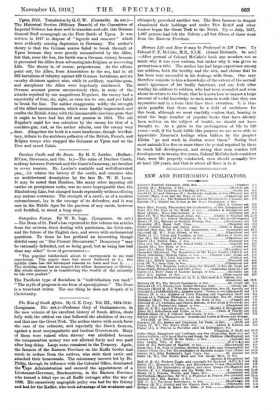The Rise of South Africa. By G. E. Cory. Vol.
IlL, 1834-1840. (Longmans. 25s. net.)—Professor Cory of Grahamstown, in the new volume of his excellent history of South Africa, deals fully with the critical era that followed the abolition of slavery and that saw the Great Trek. The author states with much force the case of the colonists, and especially the Dutch farmers, against a most unsympathetic and tactless Government. Many of them were ruined when slavery was abolished because the compensation money was not allotted fairly and was paid after long delay. Large sums remained in the Treasury. Again, the farmers of the Eastern Province on the Kaffir border had much to endure from the natives, who stole their cattle and attacked their homesteads. The missionary interest led by Dr. Philip, through its influence with the Colonial Office, dominated the tape Administration and secured the appointment of a Lieutenant-Governor, Stockenstrom, in the Eastern Province who turned a blind eye on all Kaffir outrages after the war of 1835. His excessively n.egrophile policy was bad for the Colony and bad for the Kaffirs. who took advantage of his weakness and ultimately provoked another war. The Boer farmers in despair abandoned their holdings and under Piet Rctief and other leaders began the Great Trek to the North. Up to July, 1837, 1,067 persons had left the Colony ; all but fifteen of these wont from the Eastern Province.






































 Previous page
Previous page